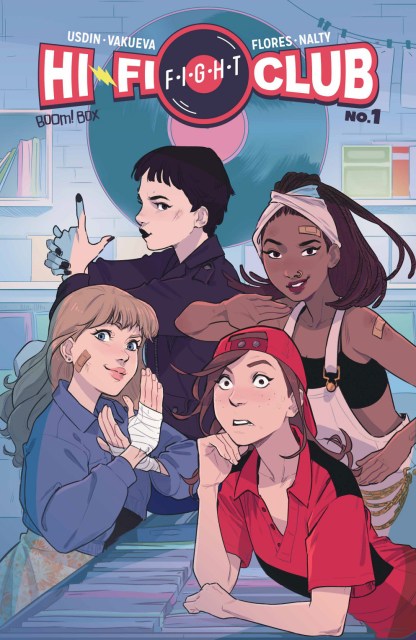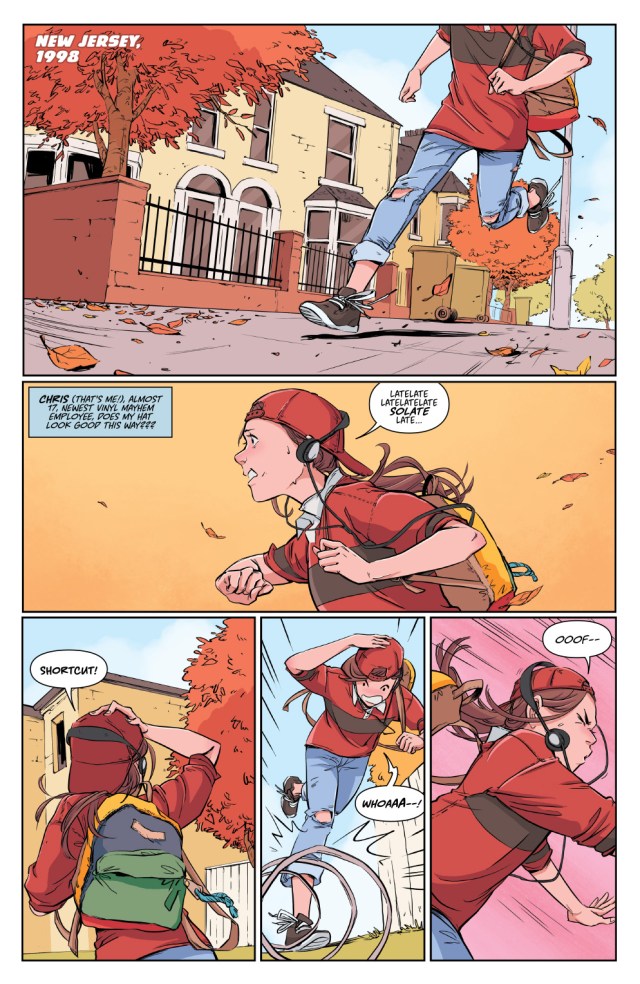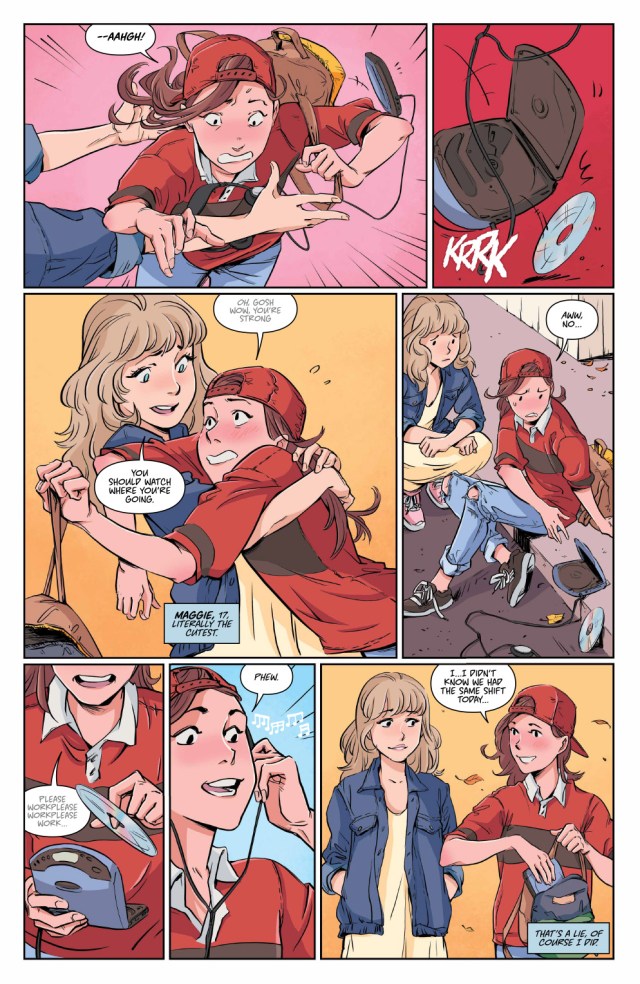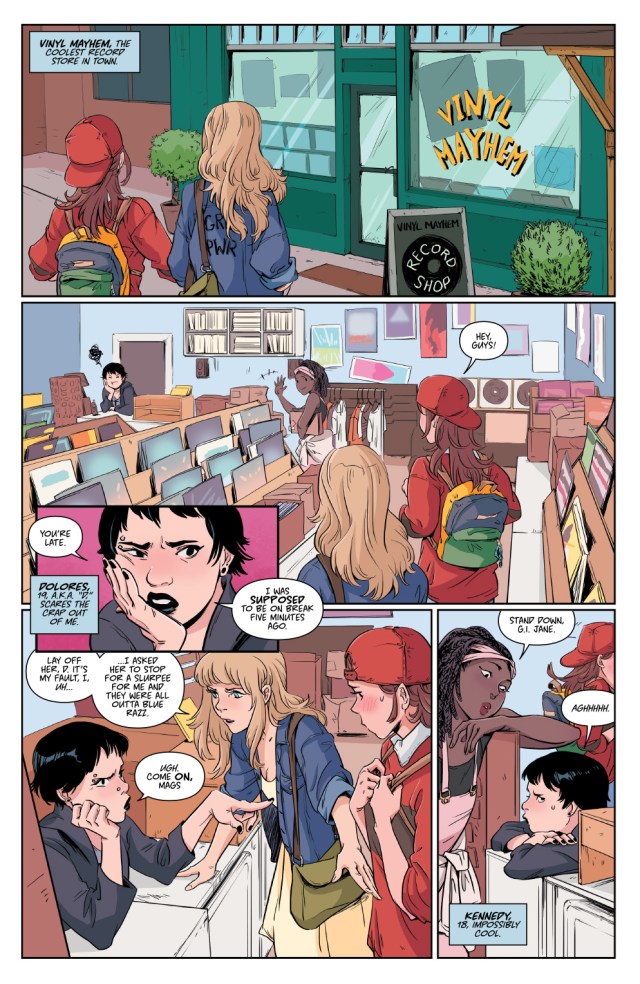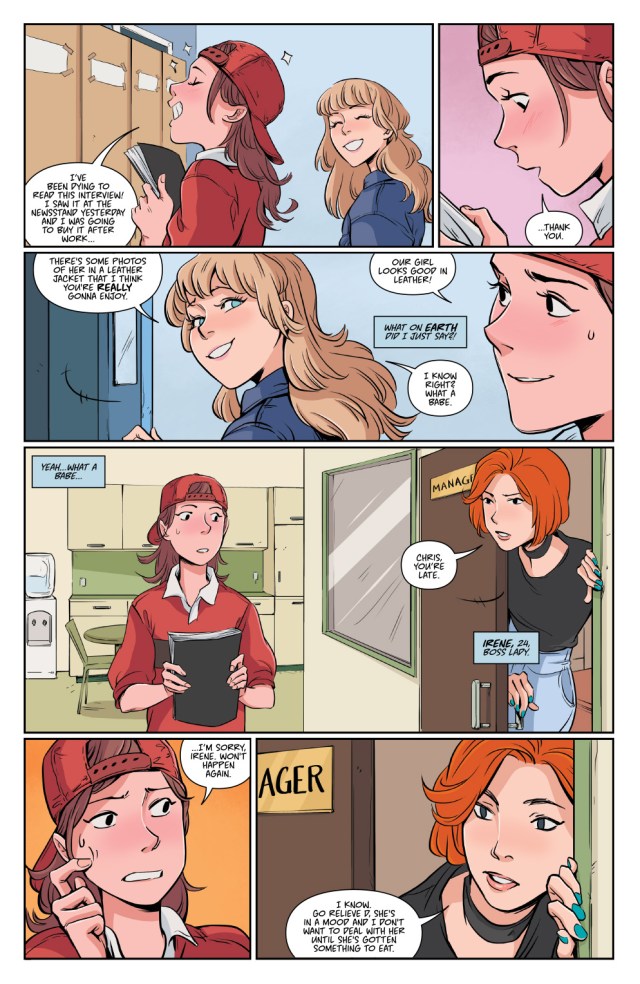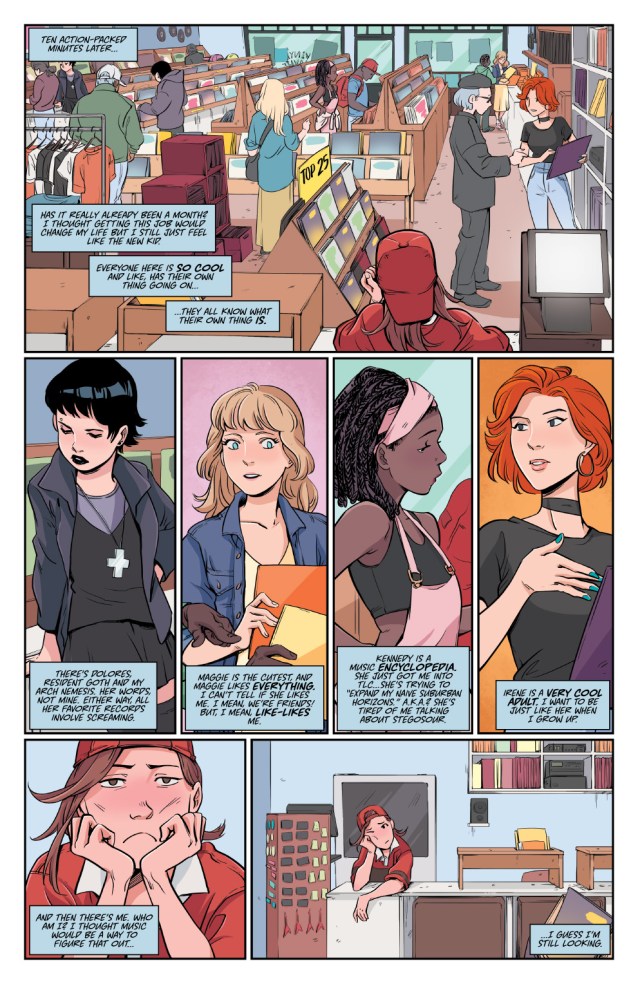Carly Usdin’s “First Date”: A Ten-Minute Lesbian Rom-Com That’ll Make You Swoon
As the founding member of Team Love Is Not a Lie here at Autostraddle dot com, I’m happy to tell you that non-binary icon / filmmaker / podcaster Carly Usdin has released a brand new ten-minute lesbian rom-com into the world, and it is the cutest dang thing I have seen in a long time! They wrote and directed the short film, First Date, for Reese Witherspoon’s Hello Sunshine MEET CUTE series, in partnership with Bumble and Baileys — and, frankly, you’ve never seen branded content integrated so slyly and gay-ly. As usual, Carly’s short films leave me wishing I was watching a feature film or binging a full season of their work on Netflix. I don’t know how they pack so many laughs, so much knowing, so many quotable one-liners, and such phenomenal chemistry into every single medium of storytelling they undertake, but I just feel lucky as heck to experience it.
First Date tells the story of Jennifer (Shalita Grant) and Anna (Shannon Woodward), a couple of queers who meet on Bumble and connect, even though they live a whole country apart. It also features your faves, Gaby Dunn and Brittani Nichols, as the best friends every gay needs to keep it real about your chances of getting catfished by a serial killer on a dating app. (And your other fave, Autostraddle’s “Who All’s Gay Here?” tee.)
Watch it now and swoon! It’ll make your day, I promise!
“Misdirection”: Carly Usdin’s Magical Queer Short Film Is Free to Stream Right Now!
I had the great good fortune of watching Carly Usdin’s short film, Misdirection, first by myself and second in a room full of queer folks at a screening at A-Camp. The first time, I laughed and had such a sweet little cry. The second time, I guffawed watching everyone react with such familiarity to the main character’s romantic plight. Yes, go for it! No… don’t! Don—I mean, maybe? No! But … yes?
Misdirection, which Carly wrote and directed as part of AFI’s Directing Workshop for Women in 2019, follows Camilla (Vico Ortiz), a college freshman recently diagnosed with OCD and in unrequited love with her roommate, as she discovers close-up magic and then loses and finds herself inside it. The film has been touring on the LGBTQ festival circuit, claiming trophies at qFlix Philadelphia, FilmOut San Diego, SENE Film, the Los Angeles Diversity Film Festival, the Hamburg Queer International Film Festival, and the Buenos Aires Film Festival. You should watch it, is what I am saying. It will make you laugh and swoon, I promise. (There’s a surprise therapist I won’t spoil for you, but you’ll love that too.)
Stay in touch with Carly on their Twitter and Instagram for more information on their upcoming projects!
Exclusive: Carly Usdin’s “Heavy Vinyl” Is Getting a New Original Graphic Novel!
It’s a great time to be a Carly Usdin stan: In addition to her short film, Misdirection — which is hitting the festival circuit hard this summer; and which was so beloved at A-Camp, the audience asked for it to be screened a second time — BOOM! Studios announced today that she’s teaming back up with artist Nina Vakueva for a new Heavy Vinyl original graphic novel! Yes, your favorite music store gal pals/secret fight club are returning! Would you like an exclusive peek at the cover? Well, of course you would.
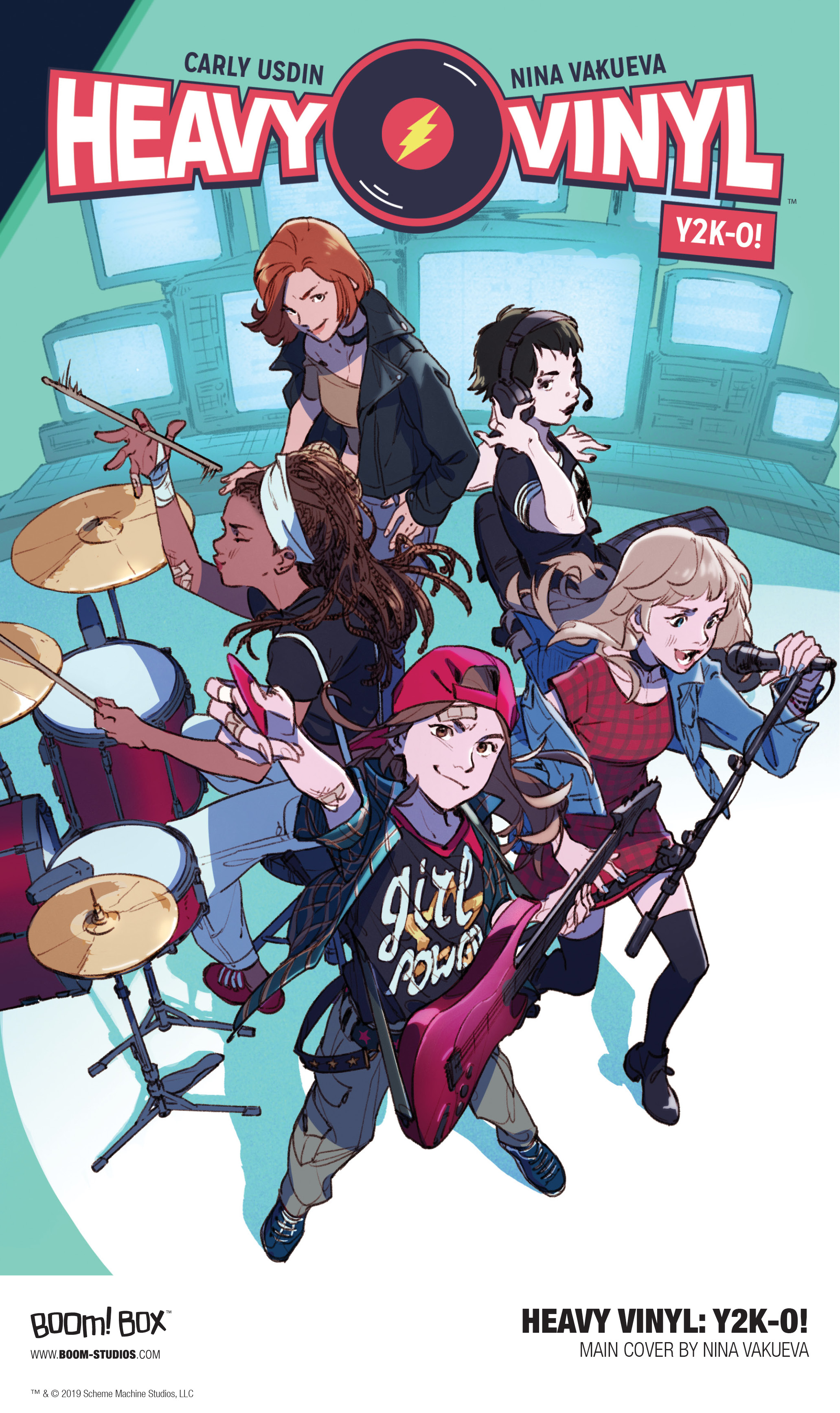
“Getting the chance to continue the Heavy Vinyl story is a dream come true! I’m thrilled to be reunited with my precious little ‘90s babies. The story picks up a few months later — It’s 1999, digital music and file sharing have upset the status quo, and Y2K approaches!!” Carly Usdin said. “You can expect the same level of exhaustively-researched pop culture references with new characters, a new mystery, and more Chris/Maggie cuteness. I’ve been having a great time writing it, and I can’t wait for fans to read it.”
Heavy Vinyl: Y2K-O will be available in March 2020. You can follow BOOM!, Carly, and Nina on Twitter to stay up to date and find out more!
Carly Usdin’s “Avant-Guards” Is the Women’s Basketball Comic Book You’ve Been Waiting for Since Before You Knew You Were Gay
If you told me just the premise of BOOM! Studios’ newest comic, The Avant-Guards, I’d be able to tell you who wrote it. Here, you try: Charlene “Charlie” Bravo, a seemingly queer girl with a complicated relationship with her past, shows up at an art school, The Georgia O’Keefe College of Arts and Subtle Dramatics, and, despite her reluctance, finds herself drawn to a legitimately diverse ragtag basketball team called The Avant-Guards. Did you guess Carly Usdin wrote this thing? You did, didn’t you? Well, you’re right!
The truth is, Charlie doesn’t want to be a transfer student at this new school and she doesn’t want any friends. While her roommate’s already got Audrey Hepburn framed above her unicorn throw pillows, Charlie refuses to unpack. She wanders around the orientation fair aimlessly and without any real interest in the clubs — Higher Art, Living Dramatically, Artpeggios — though she does pause at The Coven. That’s when a basketball thumps down beside her and she meets Jay, a student who towers over her and points to three other pals hanging out at the Avant-Guards table, trying to recruit a fifth person so they have enough players to fill out a basketball team.
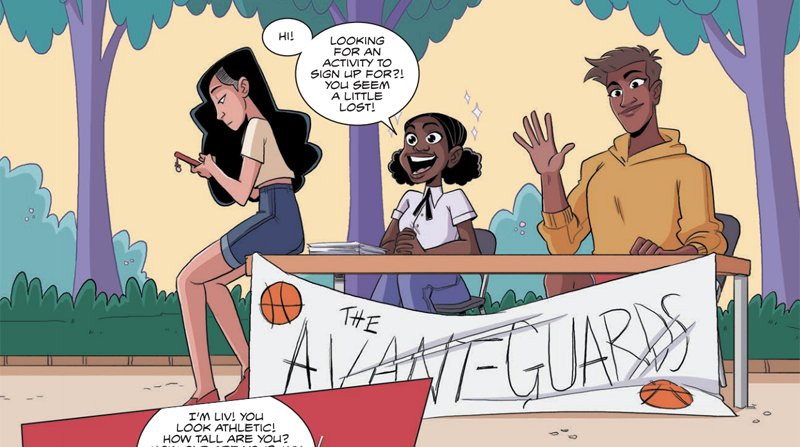
Liv is their leader; she makes Hermione Granger look like an underprepared underachiever. The lengths she’s gone to to get the school to agree to allow sports teams in the first place is impressive, and her relentless enthusiasm for basketball and her optimism that Charlie’s going to crack and join them is legitimately contagious. I was as excited as she was — well, almost! — when Charlie showed up at the gym at the end of the issue.
The Avant-Guards #1 landed this week, and while I no longer keep a pull list going at my local comic shop, I rushed out to get my hands on a physical copy of this book. Carly isn’t just a friend; she’s the writer of Heavy Vinyl, one of my favorite comic books from 2018, and the director of Suicide Kale, one of my favorite queer movies of all time. She’s proven that she’s committed to portraying all kinds of bodies and genders and sexualities and racial identities in her work, and everything she creates is just so very queer it’s impossible not to love it. Filling out this comic book team is Noah Hayes (Goldie Vance) on illustration, Rebecca Nalty (who you’ll immediately recognize from Heavy Vinyl) on coloring, and Ed Dukeshire (Buffy) on lettering.
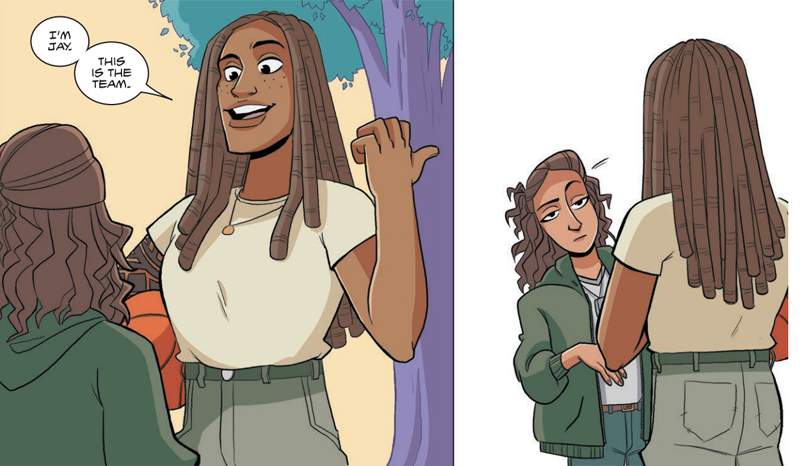
The book is warm and inviting, the characters pop, and there’s so many hidden feminist and queer jokes — does Charlie’s roommate have pink pussy hat (TM White Feminism) on her bedpost? — you’ll read it more than once plucking them out to chuckle at them. My favorite detail of issue #1 is the way Liv plays basketball. She’s a shorty and she shoots two-handed, even from the free-throw line, which means that even though she loves the game, she’s not super-skilled at it. Also, she calls Charlie Diana Taurasi, which is especially excellent because Charlie has Diana Taurasi’s exact form (but she’s left-handed). (Because she’s an athlete and an artist.)
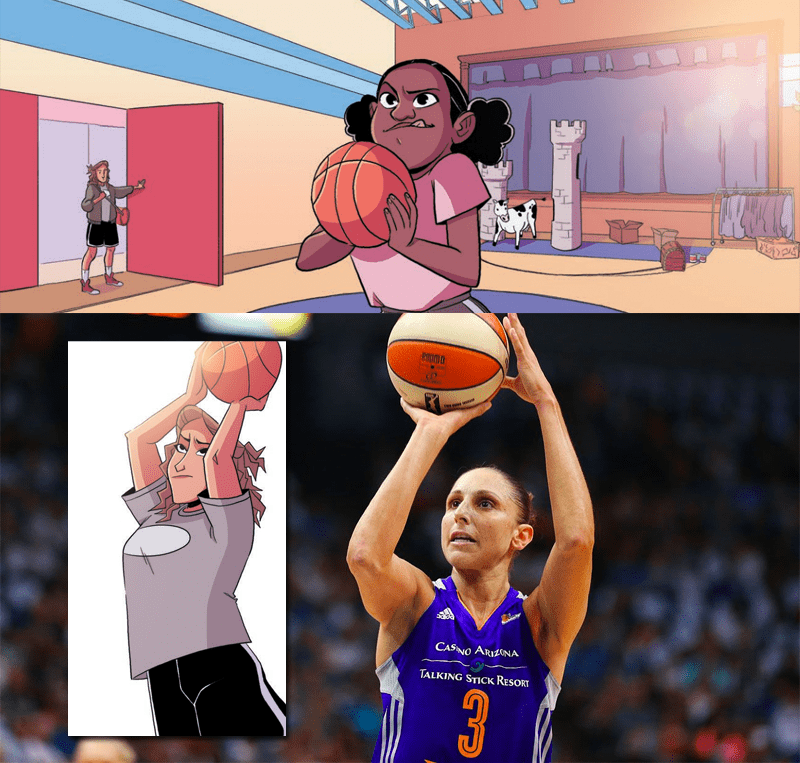
Sports comics and queer athletes are still far too rare in the wide world of representation. If you like either or both of those things, my guess is Avant-Guards is going to scratch an itch you didn’t even know you had.
Carly Usdin Is Making Hollywood Gayer Every Day (And You Can Help)
No matter how long you’ve been reading Autostraddle — even if, like me, you started reading it when it was Riese’s personal blog — you’ve always known Carly Usdin. She’s been here since the beginning, writing and editing and dreaming big dreams. And so many of them have come true! She directed the beloved, award winning feature film Suicide Kale. She’s writing an acclaimed comic book series called Heavy Vinyl (formerly Hi-Fi Fight Club). And now she’s making her very own movie in conjunction with The American Film Institute’s Direction Workshop For Women.
Carly took some time out of her busy schedule to chat with us about where she’s been and where she’s going and how things are changing in Hollywood.
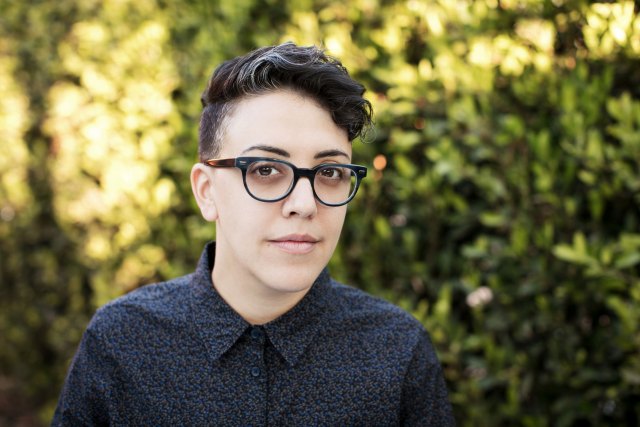
Photo by Robin Roemer.
Congratulations on being selected to AFI’s Directing Workshop for Women! That’s a huge deal! What does it mean exactly?
Thank you! It means so, so much to me, honestly. Out of 300-ish applicants they chose eight filmmakers, and I am one of those eight! My seven classmates are all brilliant, talented, accomplished women and now we’ll get several weeks of intensive training at AFI, plus each of us will be shooting a short film. And then we’ll all present those films next year at a showcase for industry folks. I am completely overwhelmed in the best possible way.
I’m really thankful for programs like this that seek to champion and support underrepresented voices. It’s unfortunate that our industry needs so many programs like this, though. I really hope that someone like me, a weirdo queer Jew, can break through and I know that this program is, for me, definitely a step in that direction.
Can you tell me a little about your new movie?
Okay, so I wrote this short film last year, called Muscle Memory, it’s an experimental romantic comedy about a college freshman who falls in love with close-up magic as an escape from her unrequited crush on her roommate and her undiagnosed OCD. Seriously.
It was inspired by some of my favorite films, like But I’m a Cheerleader and Scott Pilgrim vs. The World, and also by my life! There’s lots of ME in this film: my unrequited high school crushes, my OCD diagnosis, the specific type of OCD I have (counting, organizing), and my love of close-up magic. I noticed two things when I was taking magic lessons at the Magic Castle here in LA a few years ago: that I picked up card tricks really quickly, and that when I was doing magic I wasn’t experiencing my OCD symptoms.
A while back I wanted to make an experimental short about seeing the world the way I see it, actually bringing those compulsive behaviors to life via film, but never made it. So when it came time to write a script for my DWW application, I combined that idea with a romantic comedy about a girl who falls in love with close-up magic after being rejected by a crush.
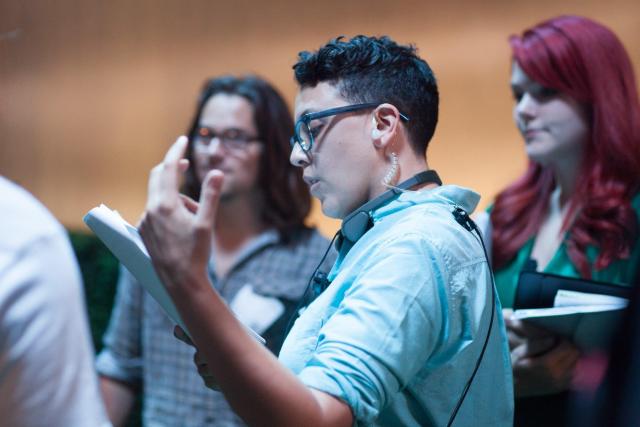
Photo by Robin Roemer.
That sounds rad as heck! What does it have in common with the work you’ve done before and what’s new about it?
This is actually the first film I’ve written. I’ve been talking myself out of writing for years and years. It wasn’t until Heavy Vinyl, that I sat down and told myself, “You’re going to write this because you want to tell this story and the worst thing that can happen is that you get notes from your editor.” So this project is me, fully putting myself out there, taking a really giant leap.
I think it’s got a little connection to everything I’ve done. So if people like Heavy Vinyl, then they’ll love the tender queer love story in this film. If they like Suicide Kale then they’ll like the witty, relatable comedy. If they like my RuPaul’s Drag Race commercials then they’ll love the high production value and visual storytelling. I don’t know that I’ll ever make anything that is so quintessentially ME ever again.
What are the best ways people can support it?
Well, I’d love for people to donate to our crowdfunding campaign, if they are able. But there are other ways to help that are just as important — “following” our campaign on Seed&Spark, and sharing it with their friends.
The really cool thing about making this with AFI is that donations can be tax deductible, because you’re actually donating to AFI and they’re a non-profit organization. So any generous benefactors out there reading this, hit me up!
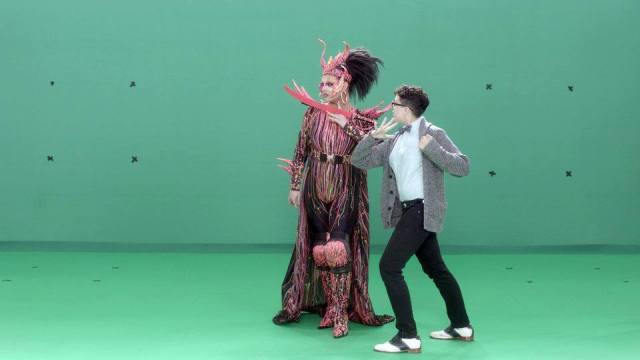
You’ve had so much success these last few years. What’s your dream for your career over the next five years?
It doesn’t always feel that way, but thank you! A lot of it is luck, so much of it is out of your control. But also I’m hustling 100% of the time just to find work and keep going and…
Wait, now I’m getting off topic. Five-year plan! Right. I’d like to make another indie feature. I’d like to actually sell and make some of the very weird TV and digital comedy series I’m developing with my friends right now. And then I want a big blockbuster franchise. I’m putting it out into the universe, right here on Autostraddle dot com. I just want people to give me money to make weird gay shit.
And I want to make more Heavy Vinyl, whether that’s more comics or a film or TV adaptation or both. I just love those characters and I know that I’m not done with them yet.
I affirm your putting that out into the universe and believe it will happen for you! How do you see the #MeToo and #TimesUp movements playing out in Hollywood for real? Is it going to create an actual difference on the ground for women filmmakers?
It honestly does feel like things are shifting. And it’s going to be a slow, intense, painful process. Because the problems are so systemic and there is so, so much work to be done and so many very powerful gatekeepers that need to either get on board or step aside. I am in complete awe of everyone speaking out as part of #MeToo and am really impressed with #TimesUp and I just hope that this is finally the time for a sea change.

Have you always wanted to be a filmmaker?
Yes. Well, I have always wanted to work in the film industry. When I was a kid I was obsessed with this TV series Movie Magic and I wanted to go into special effects. And then in high school I learned how to edit on what I believe was the first version of Final Cut Pro, and then I wanted to be an editor. My first job editing out of college was in post-production because I was terrified that I would ruin a project if I was on set (it’s really hard to irreparably ruin footage, unless you delete it all). So after years of editing I finally got the opportunity to try writing, producing and directing and I got over my fears and I just instantly fell in love.
What would little gay Carly thing of adult gay Carly’s career?
Oh man, her little gay heart would just implode, honestly. I think little gay Carly would have never dreamed of actually getting to pursue her dream career and be married to someone as incredible as Robin.
Speaking of Robin, it’s been said many times, many ways that your wife is ultimate Mommi. How do you feel about that?
Oh my god, Heather, this is so accurate. Robin Roemer is Peak Mommi. We’ve been workshopping her wardrobe for A-Camp, y’all are not even prepared for how #mommi she will be (but take lots of pictures for me because I’ll be in school in May)!
Drawn to Comics: Carly Usdin’s “Hi-Fi Fight Club” Is “Baby-Sitters Club” Meets “Empire Records,” But So Much Gayer
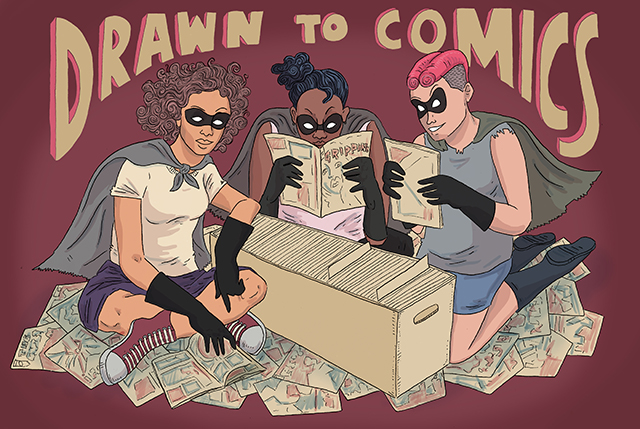
by rory midhani
Chris is your average 16-year-old queer tomboy with an awesome job at an awesome record store. Her life is full of listening to her dad’s awful music, trying to figure out if her crush Maggie is into girls, avoiding her coworker Dolores’ death stares and getting into TLC thanks to her other coworker Kennedy. Hi-Fi Fight Club would be an awesome comic just based on that alone, but wow, there’s so much more. First of all, in the first issue we find out that Vinyl Mayhem, the record shop where Chris works, is the front for a secret teen girl fight club that rescues missing musicians. Also, there’s the fact that the comic is written by Carly Usdin, who you might know from her awesome work with Autostraddle, her DJ skills at A-Camp and her directing on the groundbreaking queer film, Suicide Kale.
I loved the premise of this comic when I first heard about it and now that I’ve read the first issue, I’m so much more in love with it. It’s so many of my favorite things, and it’s by a creator I love and it’s a comic with a queer main character written by a queer writer. When you add in some really, really charming and cute art by Nina Vakueva on pencils, Irene Flores on inks and Rebecca Nalty on colors, it’s a can’t miss comic. I wish I’d been friends with these girls when I was a teen.
The first issue comes out in comic shops on August 23, but until then, here’s an interview with Carly Usdin and a short preview of the comic.
Mey: I love the ’90s setting of this comic. Why did you choose that particular era and what kind of fun are you excited to have there?
Carly Usdin: I wanted to write something that I felt a connection to. In 1998, I was a 16-year-old high school student living in New Jersey, on the verge of coming out. I’ll spare you that story (it’s ridiculous and involves the Spice Girls) but you can listen to it on my friend Mo Welch’s podcast, Come Out, Come Out. Anyway, I had a very intense connection to music and spent a lot of my free time at a local record store, always looking for new artists and music that would help me figure out who I was. So in writing this comic, I’m pulling from my adolescent experiences as well as a sense of nostalgia for that period of my life. The pop culture of the ’90s helped shape the weirdo I am today and I’m excited to get to reference it in this book.
M: This comic is giving off some serious Empire Records vibes, which I love, but it’s like if Empire Records was queer and full of women. What are some of the reference points in pop culture you want this book to evoke in readers?
C: Oh yes most definitely, Empire Records was a very formative movie for me and my friends growing up. I like to describe Hi-Fi Fight Club as equal parts Empire Records, Sailor Moon and The Baby-Sitters Club. I think there’s some D.E.B.S., Scott Pilgrim, Josie and the Pussycats and Lumberjanes in there as well.
M: Is there anything cooler than a teen girl working at a record store and fighting crime?
C: Not really. This would’ve been my ultimate fantasy when I was in high school.
M: If you worked at a record store in the ’90s, which of your favorite musicians would you want to rescue?
C: I’d like to preface this to say that I wouldn’t want anything bad to happen to ANY of these musicians, but if they were in peril and fictional teen me could have rescued them, I’d have to say Bjork, Poe, Aaliyah, The Cardigans, Letters to Cleo, Sleater-Kinney, Garbage, No Doubt and — despite being fictional — Josie and the Pussycats.
M: How gay is this comic gonna be?
C: Like, really gay. I’d say extremely feminist and very gay. And CUTE!
Check out a preview of Hi-Fi Fight Club’s first issue below!
New Releases (Aug 9th)
Batgirl and the Birds of Prey #13
Gotham Academy Second Semester #12
Captain Marvel Vol 4 Earth’s Mightiest Hero TP
Silk Vol 3 Clone Conspiracy TP
Welcome to Drawn to Comics! From diary comics to superheroes, from webcomics to graphic novels – this is where we’ll be taking a look at comics by, featuring and for queer ladies. So whether you love to look at detailed personal accounts of other people’s lives, explore new and creative worlds, or you just love to see hot ladies in spandex, we’ve got something for you.
If you have a comic that you’d like to see me review, you can email me at mey [at] autostraddle [dot] com.
You Can Buy “Suicide Kale!” Right After You Read This Interview with the Cast & Creators
When Suicide Kale made its debut in the world, I thought to myself, “Oh, this is a cool thing some people I know have done!” And then I watched it and was like, “Oh wow, this is really something special.” That’s what queer people around the country thought also: Over the course of 2016, the film, crafted from beginning to end by an all-queer women team helmed by Brittani Nichols and Carly Usdin, won a truckload of trophies at film festivals, including the Audience Award for Best Feature at both Los Angeles’ Outfest and New York City’s NewFest. And today, finally, you can buy it or stream it on Vimeo or Amazon!
Suicide Kale follows two queer couples — lovebird honeymooners Jasmine and Penny, and their long-married friends Jordan and Billie — during an afternoon cookout. During dinner prep, Jasmine finds a suicide note in Jordan and Billie’s bedroom. Who wrote it is important, but the mystery isn’t the central thread of the movie. The note forces Jasmine to examine the way she thinks about everyone in her life, including herself. No one leaves the movie unchanged, and also no one dies.
To celebrate their streaming release, I forced writer and lead actor Brittani Nichols, director and editor Carly Usdin, executive producer and lead actor Jasika Nicole, director of photography and executive producer Robin Roemer, and lead actor Lindsay Hicks to wake up early and talk to me about their movie one more time.
Heather: What was it like to release this film you made for no money in just a few days into the wild, and then watching it take off and win every film festival award on the planet?
Brittani: It was very surprising. I think we hoped —
Carly: Yeah, it was like meteoric. But go ahead Brittani.
Brittani: [Laughs] We had no idea what the festival circuit was like going into it. We were obviously “hoping for the best” but we had no idea what the best was. So we started to roll with it when we were getting into festivals and winning awards, so our ideas about how widespread our success could be really changed as we learned more about the process and about the whole film festival game.
Carly: Right, our idea of success at first was “making a film people other than us could watch” and then it was like “other than our friends could watch” and then it was like “getting into one single festival” and obviously “total world domination” after that.
Heather: The awards speak for themselves, but what’s been the response from the people you’ve spoken with in the community as you’ve toured around with the film?
Brittani: I think since the film accomplishes a lot of things, it gives different people opportunities to latch onto different things. Like, “It’s great to see people who are actually queer in a movie.” “It’s great to see butch people in a movie.” “It’s great to see people of color.” “It’s great to see lesbians just talking.” “It’s great to see lesbians not dying!” The world of queer media can be so dark sometimes and if one thing goes away all the queer representation goes away, so if you have a lot of positives going on, it gives a lot of different types of people the ability to relate and for the story to resonate with them.
Heather: Jasika and Lindsay, how did this experience compare to the other things you’ve acted on?
Lindsay: I’ve actually been really spoiled to work on small sets with mostly women.
Jasika: I studied theater at school and a lot of what we did was improv stuff, so I do feel like I had some experiences with how we made this film, but it was nice to feel like my voice was heard because most actors — unless you’re very rich and famous — don’t have a voice on set. I think it’s also harder for women on male-dominated sets to feel like their opinions matter and that they have the space to say anything, so this was a real departure from that. It was a little hard to go back to other work after this because I expected to be important still, and I wasn’t.
Carly: So this project ruined you, is what you’re saying.
Jasika: [Laughs] Yes, basically.
Heather: Robin, I rewatched Suicide Kale last night and it never stops amazing me how beautiful it is. Lesbian movies are usually so ugly. When you rewatch it do you feel like, “Wow, this is more gorgeous than Carol” or are you always finding stuff to pick apart?
Robin: Yes, I constantly go back and am like, “Wow, this is more beautiful than Carol.” [Laughs] No! Every time I rewatch it I find something to be like, “WHY!” But the nature of it is we didn’t set up any lighting. We just shot what was there. It was kind of a cool challenge and experiment to make a film like that. On a big film set, the Director of Photography and their crew will spend two hours setting up a shot, but we didn’t have time for that, so we had to focus on the story, which actually turned out to be pretty cool. Luckily Jasika’s house is beautiful and flooded with natural light.
Heather: What did y’all learn through this process that you’ll take with you going forward as you put more queer art into the world?
Brittani: Oh wow, so much. It’s been so hands on the entire way, I have learned about every aspect of filmmaking. Things you wouldn’t learn unless you were actually forced to do them for yourself. So now I can think about, “Okay, now that I’ve learned all these things, what can I do with a little more money? What can I do with a little more time? Would I have kept it the same, even if I had more resources?” So now I can think about what parts of this movie I want to carry on, no matter how many options I have.
Heather: Do you know what that is, what you want to carry on?
Brittani: Definitely the focus on the storytelling. It would be nice to have time to make things a little more beautiful, to give people a little more time with the material, but for me, the story is king, and having everyone on board with it — having everyone’s voice be a part of the overall vision — is important to me.
Jasika: For me, I want to make sure, going forward, that everyone knows where to place their lav mic. Which is something we learned at the end of our shoot.
Heather: Where is it supposed go?
Jasika: Well, it needs to be unobstructed from clothing, and it needs to be close to your mouth. One other thing: Don’t shoot a film in the summer when the air conditioning needs to be on. Just practical things someone else usually thinks about. Also, I’m not used to being on film for so long! Usually it’s 20 takes and the editor pieces together your best performances. So, I love that our movie feels so real, but there are some moments in that eating scene where I’m like, “Wow, I was just chowing down.” Okay, it is not cute to watch someone eating a full lunch.
Brittani: I would watch a film about you eating lunch.
Lindsay: I actually would too.
Brittani: It would be very compelling.
Carly: I saw someone tweeting recently about how it’s annoying that you can tell no one’s ever really eating in an eating scene, and I was like, “Well, we don’t have that problem.”
Jasika: When you’re eating in a scene, you’re trying so hard to not let your fork scrape the plate because then the sound guys come up and they’re like, “Jasika, hey, that’s really loud.” They don’t let you do anything for real.
Lindsay: Also, that food was delicious.
Heather: Jasika, did you cook?
Jasika: I did. I sent out this email and was like, “Does anyone have a dietary restriction or a problem with this lunch?” And I think they were like, “No. We know how this works. We’re not actually going to be chomping on this food.” After that scene, I was so full, and Brittani had brought lunch for everybody, so I was like, “Oh, am I supposed to eat again?” And I did.
Carly: It was collaborative. It was meal collaboration. Which, in reality, is one of the most important things I’ve taken from this film: I want every set I work on to have this sense of collaboration.
Heather: Lindsay, are you never going to work with men again? Suicide Kale has sealed the deal.
Lindsay: Honestly, maybe. I haven’t worked with men since then! I shot a web series that was all women and now I run by a production company that is run by two women. It’s literally the future I want to see, and I’m trying to make that happen for everyone.
Heather: Y’all made this movie back when Donald Trump was still Twitter’s favorite political joke and now here we are in this dark new world. Has anything changed about the way you think about your art since the election?
Lindsay: I really did lose hope for a minute. I couldn’t believe that this is how the majority of our country feels. But it does make me feel even more hopeful and committed about the power of women to create. Suicide Kale is a perfect example of some women who had an idea and they just got together and fucking did it. And when you do it, great things can happen. And when great things happen, it opens up more doors for more great things to happen.
Brittani: The election definitely solidified for me why I do what I do. Since the election, every decision has felt bigger and more important, even the tiniest thing, which I think people are starting to realize is. No matter how small something is, it’s all part of someone’s human experience. The big picture things have felt out of control, but we can control what we give of ourselves to someone else. Art and entertainment are avenues for activism, to show people that they are seen by you, that you know they exist and they matter to you.
Carly: Well, once again: What Brittani said! Representation matters. I’ve lived in New York and LA for the last ten years, in my little liberal elite bubble, but that’s not everyone’s reality. The election forced me to remember what exists outside of that.
Robin: But we don’t live in a bubble. It’s the places isolated away from population centers full of diverse humans that are in the bubble. This is real life. We are surrounded by people trying to make everyone else’s lives better. We’re in touch with the humanity of the world.
Carly: That’s true.
Jasika: I have become less apologetic, in a way, about having a viewpoint. Before the election, I would cater to other people’s comfort levels sometimes, so I wouldn’t necessarily use my voice to talk about issues that affected me. But I don’t do that anymore. I will use my voice to talk about how shitty the patriarchy is, instead of like bracing myself to see what someone else’s response is, or if I made them uncomfortable. It can be a really polarizing thing. When you do speak up and you can sense it make someone else feel weird, my normal thing is to immediately say, “Oh, but that’s just what I think!” Or, “That’s just my personal experience!” But now I realize I don’t need to be accommodating any communities that are not being kind or thoughtful to people who have experiences outside of their own.
You know, I was just at ClexaCon and I was the only woman of color on a panel speaking to mostly white women, but they were receptive to what I was saying about diversity, so while using my voice in this way can create rifts between me and certain communities, it’s also showed me there are people who are receptive to understanding the experiences of people who are different from them.
Heather: Do y’all think Moonlight winning best picture will have an affect on the film industry in a broader, more mainstream way.
Brittani and Jasika: No.
Carly: It’s hard to be optimistic about that when the industry has been resistant to change for such a long time.
Robin: I think it will have a weird impact in that there will be the white cis screenwriter guys whose idea of what Oscar bait is has been broadened, but I worry it will just result in more films like that movie Stonewall. You’re like, “Yes, a movie about Stonewall.” And then it centers on a white, cis guy.
Heather: Do you think Moonlight will have any affect on films being made about black people’s experiences?
Brittani: No. I hate to say that. But I think what will happen is executives and gatekeepers will be interested in very specific stories that intersect with some of the identity markers in Moonlight, and maybe that will have a small scale effect on independent productions — but on a larger scale, I think we’re just going to keep rebooting everything that’s ever been made. I don’t know, maybe they’ll reboot Moonlight.
Jasika: But with an all-white cast.
Carly: 2 Moonlight 2 Furious
Jasika: I think for production companies it’s about making money, so unless there’s a way to capitalize on diversity, it’s not going to happen. It’s not about humanity. It’s not about non-discrimination. Even though Hidden Figures and Jordan Peele’s Get Out have done so well at the box office, I don’t think production companies even see that as a sign that people clearly want to see more diverse stories.
Heather: Okay, what’s next for everyone?
Brittani: Carly is working on a top secret project.
Heather: Oooooh.
Jasika: I’ll go! I’m on the show Underground right now, and then an animated series I was a part of called Danger and Eggs will be debuting on Amazon at the end of June. And a project I can’t talk about.
Heather: Y’all have so many secrets!
Brittani: Well, I am writing for season two of Take My Wife.
Lindsay: I did a web series for Tello Films called The List. I mean, no big deal, but I kind of made out with Saffron Burrows and Tracy Ryerson. That’s out now. You can watch it on Tello today! And I’m going to Dinah Shore for it with some of the cast and I’m kind of terrified.
Heather: Okay, last question! Everyone give your best one-line pitch for why people should watch Suicide Kale.
Brittani: You should watch Suicide Kale if you’re lonely and want to have some friends in your life.
Jasika: Suicide Kale: It’s like Big Little Lies, but darker. And queerer.
Robin: You should see Suicide Kale if you’re interested in the complexity of human relationships and want to see a film that actually stars queer women of color.
Carly: You should see Suicide Kale because you want to support queer independent media created by women, and by doing that, it will encourage us to make more things.
Lindsay: Support queer women while watching to see where I forgot to wear my necklace a couple of days, ’cause that’s some continuity!
Heather: Would y’all work together again?
Everyone: Yes!
Suicide Kale is available to buy and stream right this very second on Vimeo and Amazon. You can also check out the official website for more information and screening dates.
No Filter: Samira Wiley Knows What We’ve Been Thinking
Welcome back to No Filter, where we unpack the week in celebrity Instagram and use the mundane images of famous people’s lives to give our own lives meaning. This week, Jenny Owen Youngs wrote a theme song for a television show I’ve never watched and it’s been the highlight of my entire week. Let’s get to work!
Introducing a new feature of No Filter, already popularized by Amandla Stenberg: Queers of note posing in idyllic landscapes. Arabelle Sicardi is enjoying this scenic overlook and you should too.
Samira Wiley’s pride outfit nails it.
Against Me! took newly out Beatrice Martin (Coeur de Pirate) on stage in Toronto and it was pretty adorable.
https://www.instagram.com/p/BHNCAGVBHuR/
Like, I know objectively that Taylor Schilling and Piper Chapman are two different people and that Piper Chapman isn’t real (and that that’s Piper Kerman, OKAY I KNOW) but there’s definitely a part of me that’s rolling my eyes like, “Of fucking COURSE you have a stunt double in prison.”
I have never watched Rizzoli and Isles but I would start if this became the theme song.
Well these two are really cute.
https://www.instagram.com/p/BHI5jUaDtQ3/
The composition of this picture is insane, like I don’t understand why Amandla’s Instagram isn’t in a museum.
Resident party animal Carly Usdin found a quiet place to relax at VidCon.
https://www.instagram.com/p/BHF0Bkygfzs/
St Vincent is working really hard to match Amandla’s Instagram game and it’s working.
Queen Latifah wonders what she’s doing in this column.
Join us next week, when Amandla Stenberg probably branches out into Instagram sculpture, somehow.
